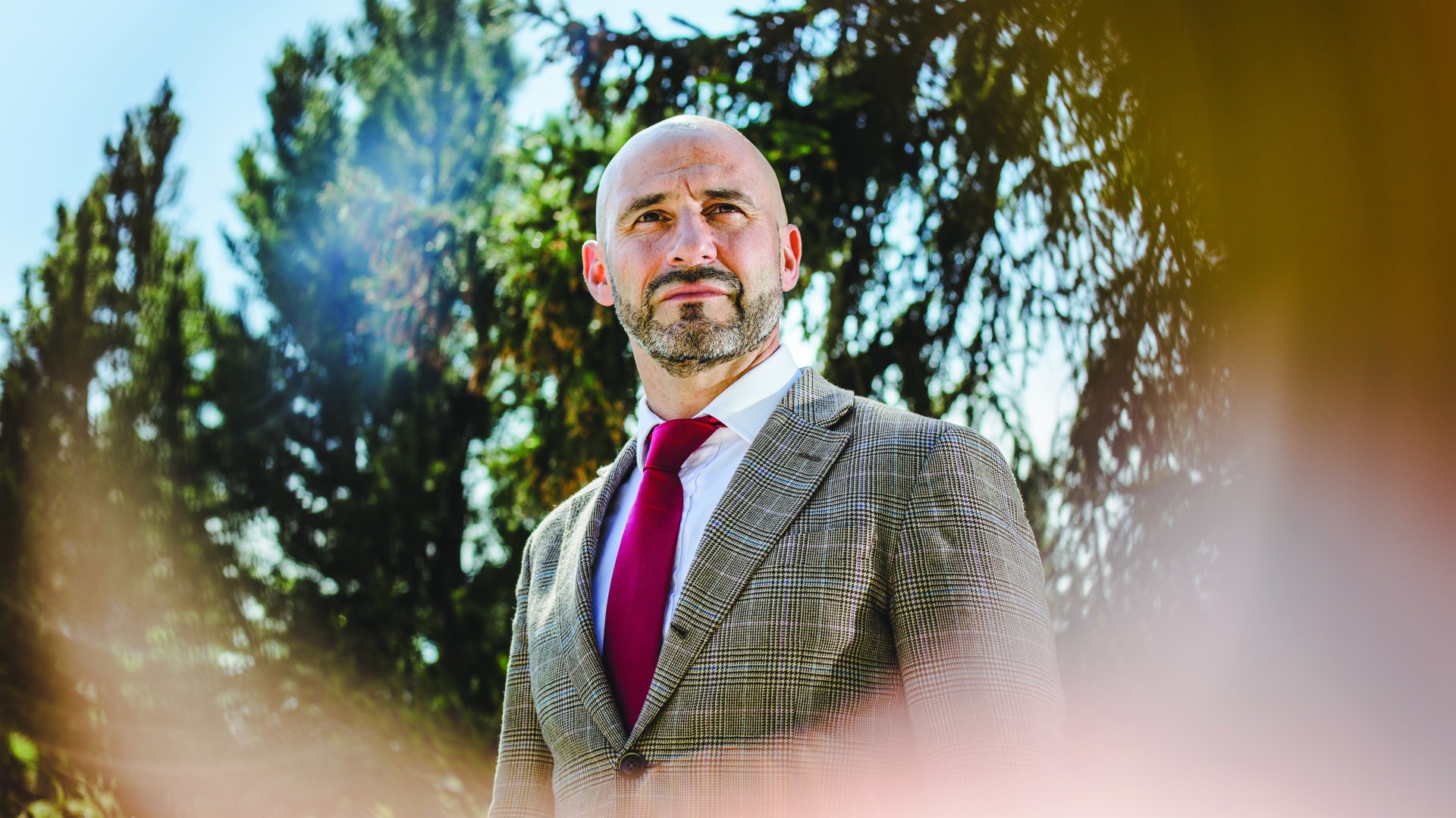Exactly ten years ago, I was preparing to go to Berlin and broadcast the World Cup. The World Cup final is the most-watched sporting event on the planet—in 2014, the final game drew 1 billion viewers. I was in Germany as an ex-professional soccer player pursuing a career as a broadcaster/analyst. I never could have predicted that two years after that, I would give it all up and move to the Canadian Rockies with my wife and children.
After the move, my phone rang off the hook with media outlets wanting to know how anyone could trade a dream career with the BBC for anonymity in Alberta. The answer is a story of God’s grace and a tale of two turning points.
The Art of Turning
One skill my dad taught me as a child was the art of turning with a soccer ball. I was never going to be tall, so he would take me into our backyard in Southeast London and teach me how to quickly switch directions with the ball at my feet. “The big guys won’t be able to catch you!” he said. For hours I would practice turning to the left and right, dribbling in and out of cones, spinning this way and that. My dad was right: the art of turning served me well. Many of the goals I scored in the years to come were a result of that lesson.
I grew up around the smell of the dressing room, the sweat of the training ground, and the stadium on a Saturday. My father was a professional soccer player for Charlton Athletic (1962–78). Being the son of a local soccer star, I had inspiration all around me as well as a wonderful teacher and role model. Naturally my childhood was filled with dreams of following in my dad’s footsteps.
I was not brought up in a Christian home and never heard the gospel preached. Sunday school gave way to Sunday soccer. The most biblical form of instruction I received was in assemblies at the Church of England school that I attended. I was a kid who intensely wanted to achieve in the classroom and on the field. My father taught me the necessary self-control, discipline, and skills to succeed in education and in the professional sports arena.
At age 16, I left school and signed a professional contract with Premier League Queens Park Rangers (QPR). I had achieved the goal—and I wasn’t really happy. I was playing for the England Youth National Team, and it wasn’t long before I broke into the starting eleven at QPR. But I was an insecure young man in the cutthroat world of professional sport. Soccer was my god. If I played well on a Saturday I was high, if I played poorly I was low. My sense of well-being depended entirely on my performance. I soon realized that achieving the goal wasn’t all it was cracked up to be.
Turning to Christ
Then, when I was 18, God intervened in my life, the first of two dramatic turning points. I was still struggling to find purpose, so I decided to attend a local Methodist church one Sunday evening. I don’t remember what the minister preached on, but afterward he invited me to his house, where he and his wife hosted a weekly youth Bible study.
I walked into a room full of young people as the one with money, career, and fame. I even rolled up in the car I had bought, a 1980s icon, the Ford Escort XR3i. I was the in crowd, and they were not. Yet when they spoke about Jesus, they displayed a life and joy that I did not have. They talked about sin as if it had consequence and about God as if they knew him. I was a Moralistic Therapeutic Deist before the term was coined. I thought God existed to make me happy and that if I were a good person I’d go to heaven.
I decided to return to the Bible study the following week and the next, and I began to hear the gospel for the first time. I realized that my biggest problem wasn’t whether I met the disapproval of a 20,000-strong crowd on Saturday; my biggest problem was my sin and the disapproval of almighty God. I realized that the biggest obstacle to happiness was that soccer was king instead of Jesus, who provided a perfect righteousness for me. I realized what Augustine had expressed many years before in his Confessions: “Thou hast made us for thyself, O Lord, and our heart is restless until it finds its rest in thee.” Over time, my eyes were opened through that Sunday meeting, and I turned, repented, and believed the gospel. My heart still burned for soccer, but it burned for Christ more.
I was open with my teammates and immediately told them I had become a Christian. Their reaction was a mixture of mockery and intrigue. Then they watched to see if my life matched my profession of faith. People often ask if it’s difficult being a Christian and a star athlete. I answer, “It’s difficult being a Christian in any walk of life.” The battle against the world, the flesh, and the Devil is difficult for everyone.
Christian maturity is a slow process, but in the world of professional sport, your slow sanctification is on show.
Perhaps the difference in professional sport is that the highs and lows of life are extreme, very close together, and very public. The scrutiny is intense. Christian maturity is a slow process, but in the world of professional sport, your slow sanctification is on show. You can sign a lucrative contract one day, and your career could be finished by one tackle the next day. Those were thrilling and testing days, filled with massive highs and lows, cup finals and promotions, defeat and relegation. I experienced the full gamut as a believer.
Uncertainty plagues the professional soccer player. On one level the uncertainty and drama spur men on to play their best; on another level they cause deep insecurity. That used to be me as a young man, but as a Christian I now feared the Lord more than the crowd. Soccer wasn’t my idol anymore.
The biggest test of that truth came when it was time to end my career. I was 35 with a chronic knee injury and knew the day had come to retire. Giving up a good thing or having it taken away reveals how much you love the Lord. Through the pain of our losses he shows us that he is always with us and asks us if he is enough. And so it was when I ended my 18-year career in July 2002. It was a privilege to play for QPR, Chelsea, and Newcastle United, but the schoolboy dream was over.
Turning to Ministry
A door opened for a broadcasting career with the BBC, and it wasn’t long before I was covering weekly shows, like Match of the Day, for several million UK viewers. It was a job that found its apex at the 2006 World Cup. Yet shortly afterward the second turning point came: the call to pastoral ministry.
Until then I had always had opportunities for Christian witness as a soccer player and broadcaster, but never had the urge to preach. Then, while reading though the pastoral Epistles, I began to feel a strong desire to pursue pastoral ministry. My church affirmed the call, and after a period of testing, I knew I was going to give up a second dream career for ministry. My public profile in the UK was high, so a season of study in Canada, where we had regularly visited, seemed to be a good decision. In 2008, I left the shores of England. Within weeks I went from speaking on TV about David Beckham and Cristiano Ronaldo to writing papers on John Calvin and Jonathan Edwards.
Remarkably, I am still here as a pastor at Calvary Grace Church in Calgary and international director for the Council on Biblical Manhood and Womanhood. One of the great needs of the day is biblical manhood, and one of my passions is to build men for Christ and help the church see the beauty of complementarity.
All those years ago, my earthly father taught me the art of turning, but it was my heavenly Father who turned me first to Christ and then to preach his gospel. Turning from sin and trusting in Christ for salvation isn’t just a one-time initial event; it is the substance of the Christian life. As Luther said in the first of his 95 Theses, “When our Lord and Master Jesus Christ said ‘Repent,’ he intended that the entire life of believers should be repentance.” This is a message the church needs to recover. And so I continue to turn and teach others to turn.
Gavin Peacock is missions pastor at Calvary Grace Church in Alberta and coauthor of The Grand Design: Male and Female He Created Them. Follow him on Twitter @GPeacock8










